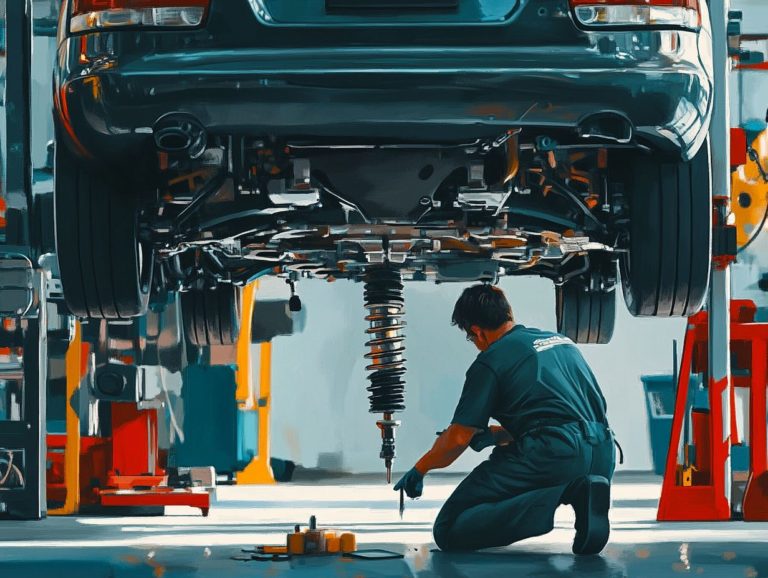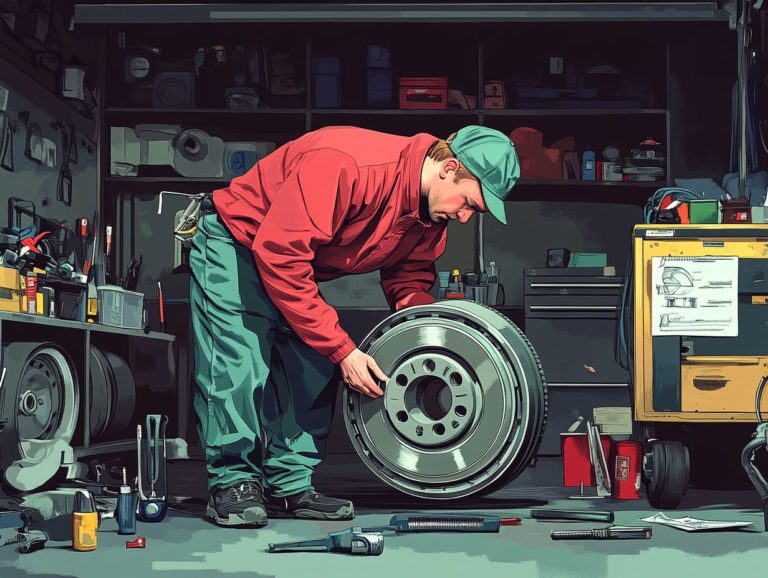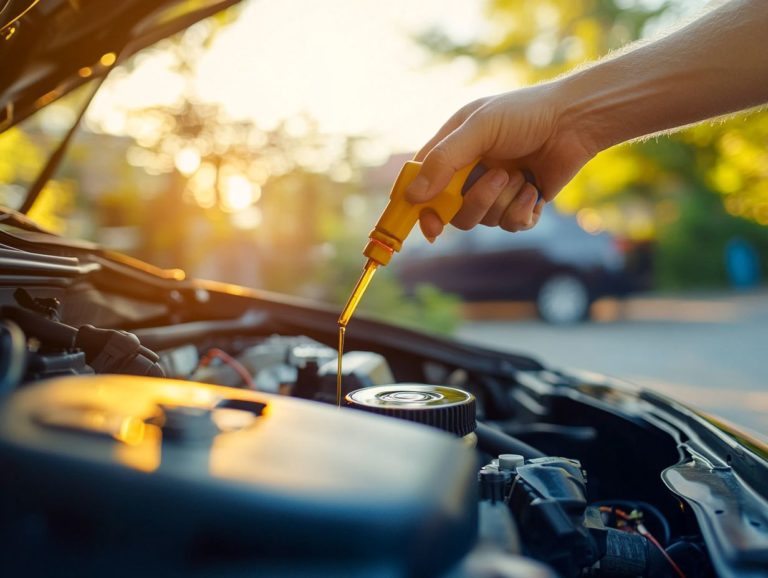5 Seasonal Car Maintenance Tips You Need
Maintaining your car as the seasons shift is crucial to keep you safe on the road! From verifying tire inflation to inspecting brakes, a few key tasks can significantly enhance your driving experience.
This article delves into five crucial seasonal car maintenance tips that every driver should adhere to. It also emphasizes the importance of routine checks, outlines how frequently you should service your vehicle, and highlights the potential repercussions of neglecting maintenance.
Take action now to keep your ride smooth and safe all year long!
Contents
- Key Takeaways:
- 1. Check Tires Monthly for Safety
- 2. Change Your Windshield Wipers Regularly
- 3. Get Your Battery Checked Regularly
- 4. Check Your Fluid Levels
- 5. Inspect Your Brakes
- Why Is Seasonal Car Maintenance Important?
- Frequently Asked Questions
- 1. What are the top 5 seasonal car maintenance tips I need to know?
- 2. How often should I check my tire pressure for seasonal car maintenance?
- 3. Why is it important to change my windshield wipers for seasonal car maintenance?
- 4. When should I test my car battery for seasonal car maintenance?
- 5. How often should I change my oil for seasonal car maintenance?
- 6. Why should I check my brakes for seasonal car maintenance?
Key Takeaways:
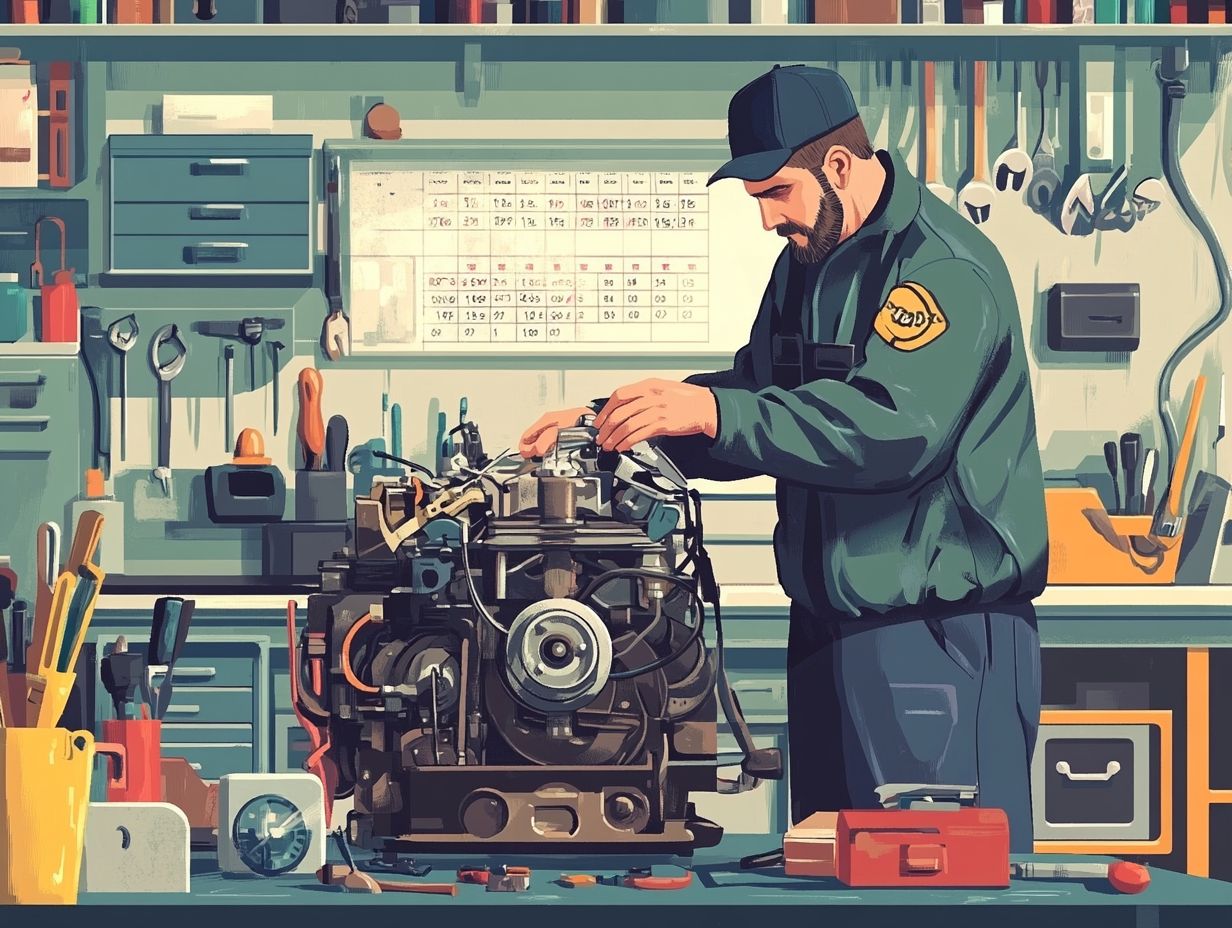
- Proper tire inflation and tread depth are crucial for safe driving and fuel efficiency.
- Change your windshield wipers regularly to ensure clear visibility during inclement weather.
- Check your battery regularly to avoid unexpected breakdowns and extend its lifespan.
1. Check Tires Monthly for Safety
Checking your tires for proper inflation and tread depth is essential to maintaining your vehicle s performance, particularly in the summer when road conditions can be unpredictable.
By ensuring your tires are adequately inflated and in good shape, you can prevent issues like engine overheating (when your engine gets too hot) and loss of traction (which makes it harder to control your car), both of which pose significant safety risks on the road.
Maintaining the correct tire pressure not only boosts fuel efficiency but also enhances handling and braking response, leading to a safer driving experience. Regularly checking tread depth preferably with a tread depth gauge allows you to identify when it s time for a replacement.
Worn tires can drastically diminish grip, especially in wet conditions. It s advisable to conduct these checks monthly or before embarking on long trips.
Familiarizing yourself with the recommended tire pressure, found either in your vehicle’s manual or on a sticker inside the door frame, is key. By dedicating a bit of time to these maintenance tasks, you can ensure your vehicle remains safe, efficient, and a pleasure to drive.
2. Change Your Windshield Wipers Regularly
Changing your windshield wipers is a vital component of your seasonal car maintenance that directly impacts your vehicle s safety, particularly during those summer rainstorms when visibility can take a nosedive.
Neglecting this straightforward yet critical task can lead to subpar cleaning performance, leaving you with streaks and smudges that block your line of sight. When wiper blades become worn or damaged, they struggle to effectively clear water, dirt, and debris, significantly hindering your ability to spot hazards on the road.
You ll find a variety of windshield wipers on the market, including traditional, silicone, and beam blades, each with its unique benefits regarding durability and performance. It s wise to replace your wipers every six to twelve months, but regular inspections will help you keep them in prime condition.
Adopting simple maintenance practices, such as cleaning the blades periodically and checking for cracks or tears, can further boost their effectiveness, ensuring you maintain a clear view, even in the most challenging weather conditions.
3. Get Your Battery Checked Regularly
Getting your battery checked regularly is essential for maintaining your car’s performance, particularly during those sweltering summer months when battery wear can ramp up due to increased temperatures and demands on your electrical system.
Keep an eye out for signs of wear, like a slow engine crank, dimming headlights, or that pesky check engine light on your dashboard, as these may signal that a replacement is in order. Regular inspections can save you from unexpected breakdowns and guarantee reliable starts, especially in extreme temperature conditions.
To effectively maintain your battery health, consider using a multimeter to check voltage levels or investing in a battery analyzer for deeper diagnostics. Keeping those terminals clean and tightly secured is crucial for smooth performance, helping you dodge costly repairs and extend your battery’s lifespan.
Have you checked your car s maintenance lately? It could save you from a headache down the road!
4. Check Your Fluid Levels
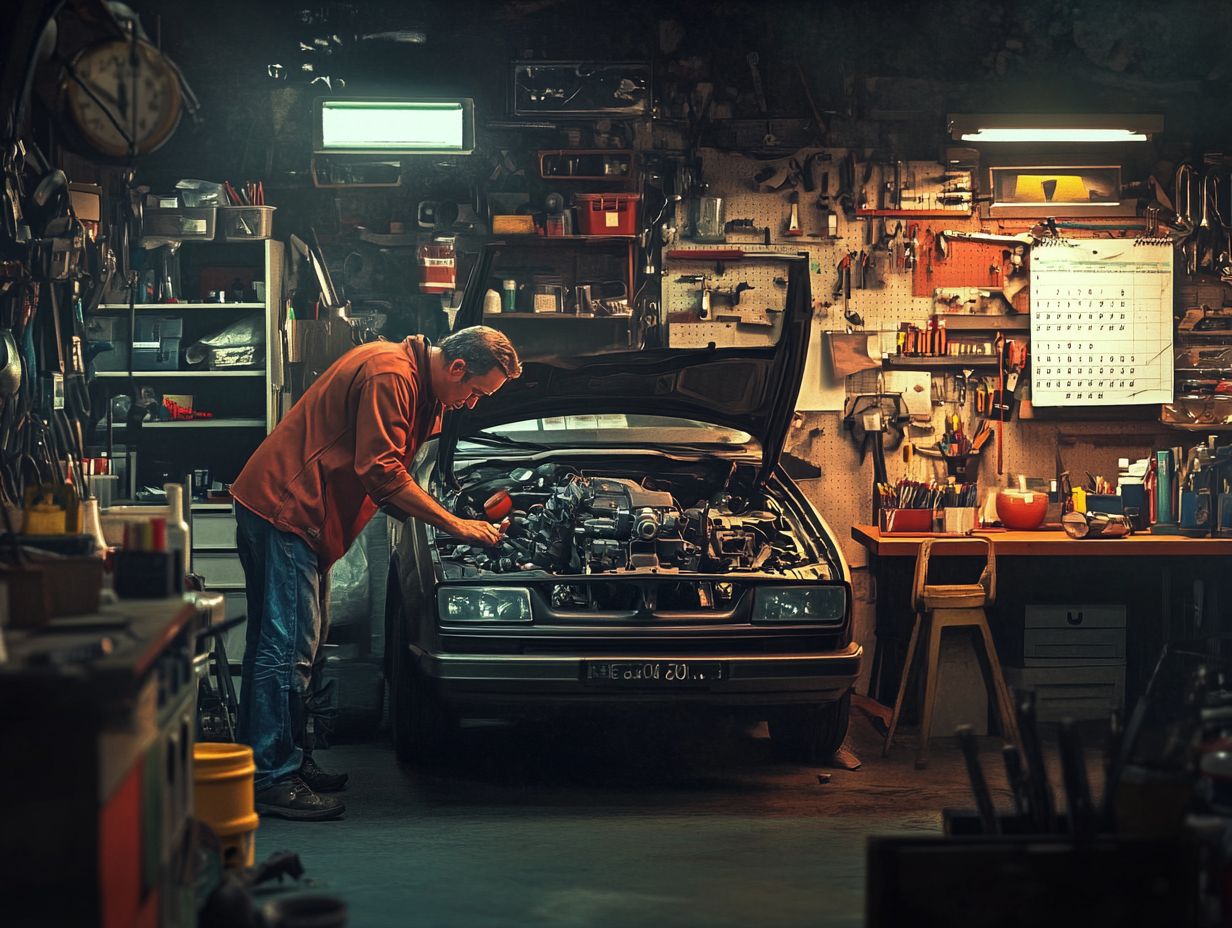
Checking your fluid levels is a fundamental aspect of maintaining your car. It ensures optimal performance and prevents issues like engine overheating during sweltering summer months.
To begin, make it a habit to regularly inspect your coolant levels by glancing at the reservoir tank. Ensure it s filled to the appropriate mark and free from any debris.
Oil thickness is equally important. Checking the oil dipstick at least once a month will help you decide if it s time for a change, especially if the oil appears dark or gritty.
Don’t overlook brake fluid and transmission fluid monitoring these is vital. Both directly impact your vehicle’s safety and drivability. By incorporating these routine checks into your seasonal maintenance, you can catch potential issues early and significantly reduce the likelihood of costly repairs that arise from neglect.
5. Inspect Your Brakes
Regularly inspecting your brakes is crucial for your vehicle’s safety. This is especially important during the summer months when road conditions fluctuate and the demand for braking intensifies.
Stay alert about your brake components to ensure your safety. Essential components like brake pads, rotors, and fluid levels must be monitored closely. Worn-out brake pads can dramatically diminish your stopping power, while warped rotors may introduce unsettling vibrations when you brake both present serious safety risks.
Routine maintenance is essential. Check your fluid levels ideally every six months or before embarking on long road trips. Ensure that the brake lines are free from leaks and that all components are devoid of rust or debris.
By remaining proactive, you not only prolong the life of your braking system but also ensure its optimal performance.
Why Is Seasonal Car Maintenance Important?
Seasonal car maintenance is essential for ensuring your vehicle’s longevity and reliability. For instance, knowing how to maintain your car during winter plays a critical role in preventing common issues like engine overheating and enhances your safety by addressing potential problems before they escalate.
Neglecting routine check-ups can lead to severe consequences. For instance, if you overlook your brakes, they might fail at a crucial moment, putting both your safety and that of your passengers at risk. Worn-out tires can jeopardize traction on wet or icy roads, increasing the likelihood of accidents.
By proactively tackling these concerns with regular maintenance checks, you protect your investment and elevate your vehicle’s overall performance. This proactive approach can significantly lower long-term repair costs, making it an intelligent choice for anyone wanting to keep their vehicle in peak condition while enjoying peace of mind on the road.
What Are the Most Important Aspects of Seasonal Car Maintenance?
The key elements of seasonal car maintenance encompass regular oil changes, coolant flushes, and thorough inspections of critical components like tires and brakes. For a comprehensive approach, learn how to inspect your car for seasonal changes. These steps guarantee peak vehicle performance.
Engaging in these tasks extends the life of your vehicle and ensures safe driving conditions. Routine oil changes maintain proper engine lubrication, while coolant flushes guard against overheating, which can result in serious engine damage.
By inspecting tires for wear and confirming that brakes are functioning optimally, you significantly reduce the risk of accidents. Each of these components is crucial to your vehicle’s overall safety and efficiency; neglecting them could lead to mechanical failures, jeopardizing performance and the safety of occupants.
Don’t wait for warning signs! Regular checks can save you from expensive repairs. Schedule your maintenance checks today to keep your vehicle safe and performant.
How Often Should You Get Your Car Serviced?
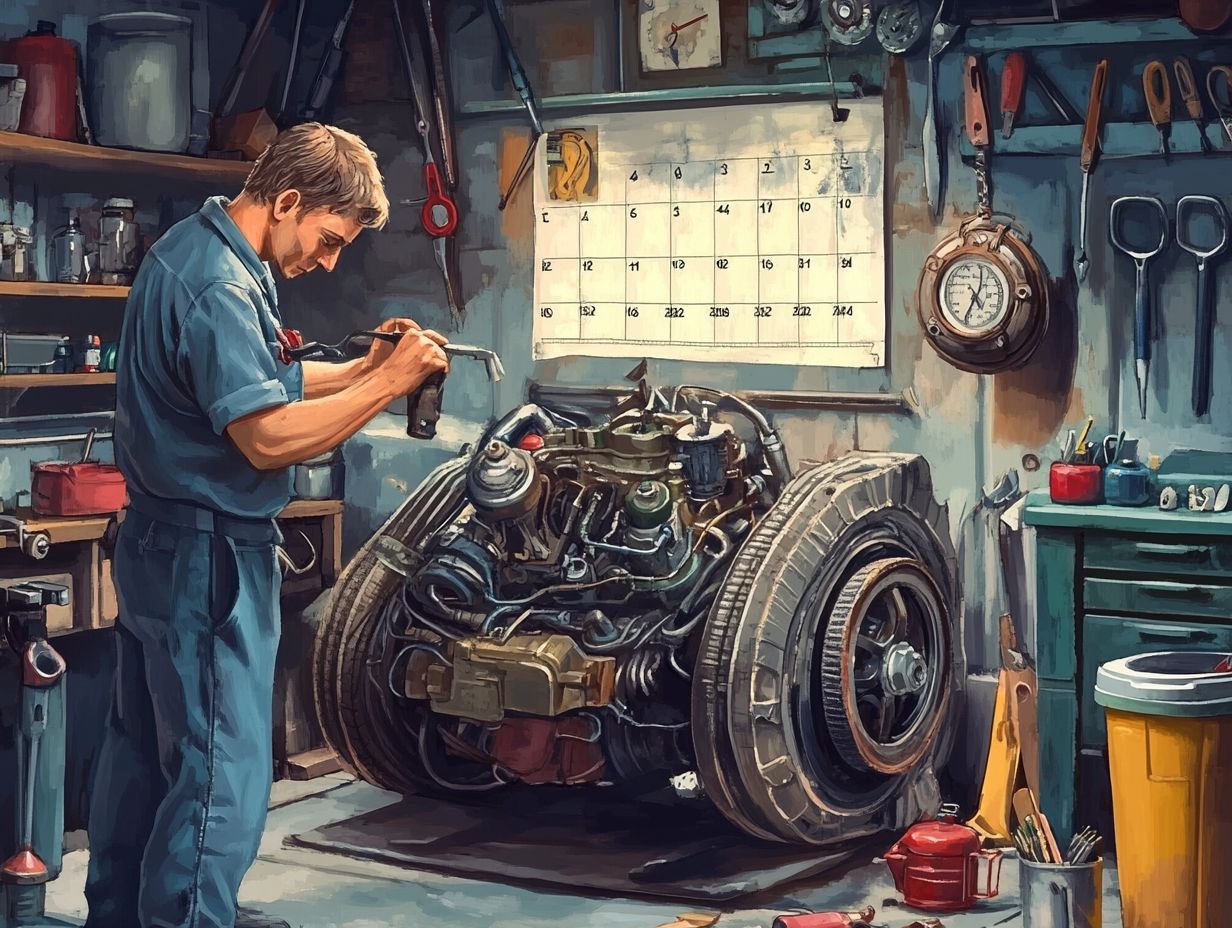
You should aim to service your car at least every six months or 5,000 miles, whichever comes first. This ensures optimal performance and maintains safety on the road.
Several factors influence your vehicle’s servicing needs. Your driving habits, the car’s age, and seasonal changes all play a role.
If you frequently navigate stop-and-go traffic, regular maintenance is essential to counteract the damage over time. In contrast, if you primarily cruise along highways, your maintenance needs might be less frequent.
Older vehicles often require more regular check-ups to catch potential issues before they escalate. Seasonally, shifts can significantly affect your vehicle’s health.
Cold weather can strain batteries, while hot temperatures can accelerate the breakdown of essential fluids. A solid maintenance schedule should encompass thorough inspections of critical components, such as:
- Brakes
- Tires
- Oil and fluid levels
- Filters
- Battery condition
Staying proactive keeps your car running smoothly! This ensures your driving experience remains safe and enjoyable.
What Are the Benefits of Regular Car Maintenance?
Don t miss out on the amazing benefits of regular car maintenance! You gain improved safety, enhanced engine performance, and increased longevity making it a smart investment for any car owner.
By staying on top of routine checks, oil changes, and tire rotations, you can significantly cut down on costly repairs later. A well-maintained vehicle typically achieves better fuel efficiency, which keeps your wallet happy at the pump and helps reduce your environmental footprint.
Beyond the financial perks, knowing your vehicle is operating at its best offers you peace of mind on the road. This freedom allows you to focus on the journey ahead rather than worrying about potential breakdowns.
Ultimately, regular maintenance instills a sense of reliability and assurance that both you and your vehicle are primed for any adventure that awaits!
What Are the Consequences of Neglecting Seasonal Car Maintenance?
Neglecting seasonal car maintenance can lead to serious consequences, including engine overheating, decreased vehicle performance, and safety hazards that put both you and others on the road at risk.
If you fail to check your oil levels regularly, your engine may face unnecessary wear and tear, potentially leading to costly repairs.
Tire maintenance is equally crucial; improper inflation or worn tires can severely impact your vehicle’s handling, increasing the risk of blowouts that could endanger lives.
Neglecting your coolant levels can lead to overheating, which might ultimately result in catastrophic engine failure. These issues not only jeopardize your safety but also come with significant repair costs that can accumulate over time.
Maintaining your vehicle isn’t just about keeping it running it s about ensuring your peace of mind and financial stability.
Regular maintenance is essential for a safe, smooth ride. Schedule your service today!
What Are Some Common Mistakes People Make with Seasonal Car Maintenance?
Common mistakes in seasonal car maintenance often include overlooking fluid levels and delaying oil changes. To avoid these issues, it’s essential to follow the best practices for car maintenance in winter. Skipping regular inspections can seriously compromise your vehicle’s safety and performance.
These oversights typically arise from busy lifestyles or a lack of knowledge about vehicle care. This can lead you to unknowingly undermine your car s functionality. For example, neglecting to check essential fluid levels, such as coolant, brake fluid, and windshield washer fluid, can result in serious complications like overheating or poor visibility during a downpour.
Regular oil changes are vital for keeping your engine lubricated and functioning smoothly. Postponing them increases the risk of engine wear and can lead to expensive repairs down the line.
Skipping routine inspections means minor issues like worn brake pads (the parts that help stop your car when you press the brake pedal) or insufficient tire tread can escalate into significant, costly problems.
To steer clear of these pitfalls, set reminders today to keep your car in peak condition! Conduct simple visual inspections regularly to ensure your vehicle remains in optimal shape.
Frequently Asked Questions
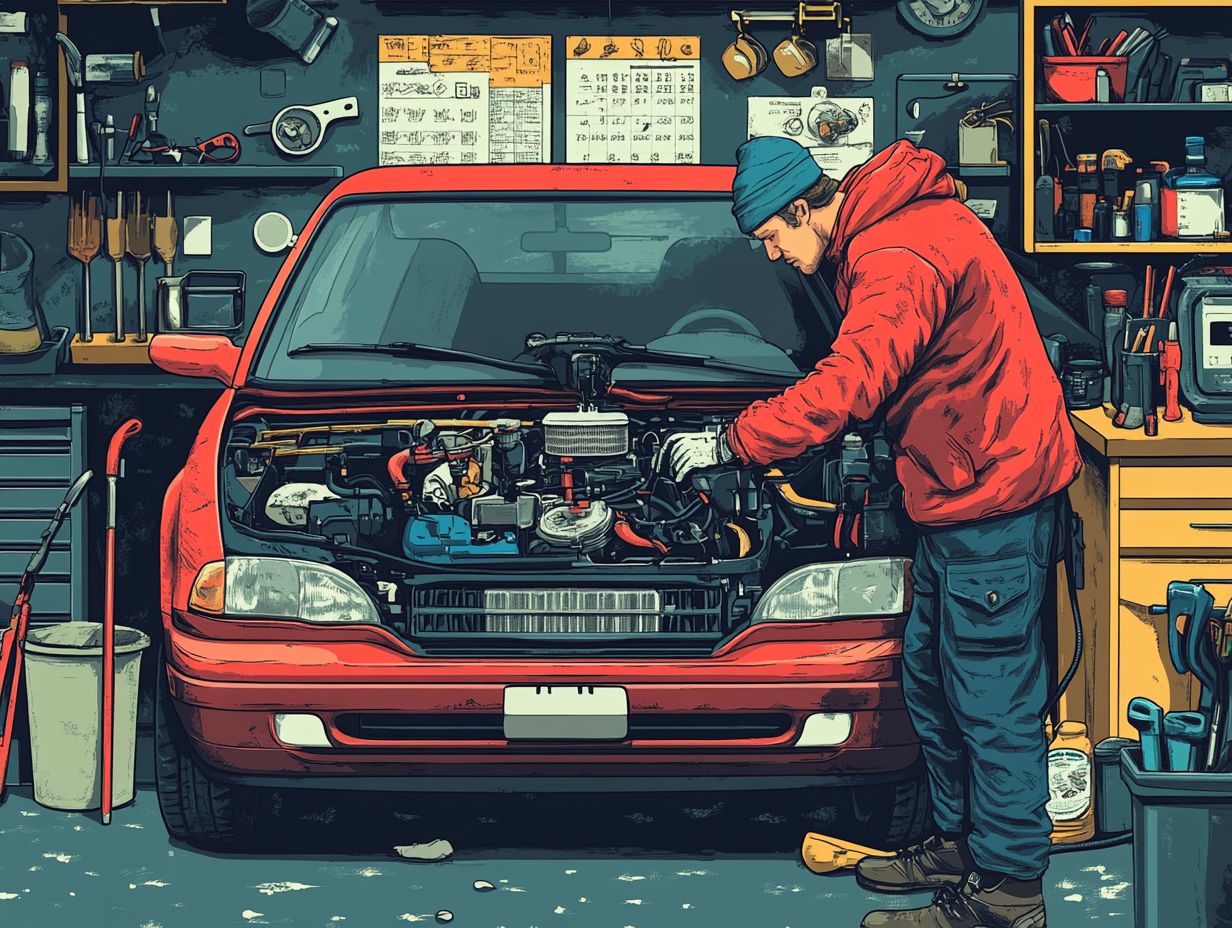
1. What are the top 5 seasonal car maintenance tips I need to know?
The top 5 seasonal car maintenance tips you need to know are: checking your tire pressure, changing your windshield wipers, testing your battery, changing your oil, and checking your brakes. For a comprehensive guide, refer to the ultimate checklist for seasonal car maintenance. These simple steps can save you time and money!
2. How often should I check my tire pressure for seasonal car maintenance?
You should check your tire pressure at least once a month and before any long trips. It s especially important to check during seasonal changes to ensure your tires are properly inflated for the changing weather conditions.
3. Why is it important to change my windshield wipers for seasonal car maintenance?
Changing your windshield wipers ensures that you have clear visibility while driving in different weather conditions. Over time, wiper blades can become worn and less effective, so it’s important to replace them for optimal safety on the road.
4. When should I test my car battery for seasonal car maintenance?
It’s recommended to test your car battery at least twice a year, preferably before the start of the winter and summer seasons. This will ensure that your battery is in good condition and can handle the increased demands during extreme temperatures.
5. How often should I change my oil for seasonal car maintenance?
The general rule of thumb is to change your oil every 3,000 to 5,000 miles, or every 3-4 months. However, consider the type of driving you do and the recommendations in your car’s manual for more accurate intervals.
6. Why should I check my brakes for seasonal car maintenance?
Checking your brakes is crucial for your safety on the road. Over time, brake pads can wear down and become less effective, so it’s important to have them inspected and replaced if needed before the start of each season.



